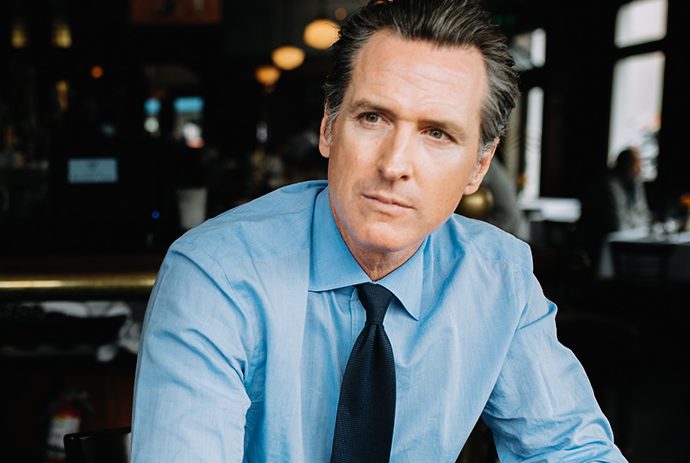
Governor Newsom and Prime Minister Jacinda Ardern at the California and New Zealand Partner to Advance Global Climate Leadership press conference, San Francisco, CA, May 27, 2022. (Photo: Sheila Fitzgerald/Shutterstock)
Norms are Karens
There are unwritten rules, which do not necessarily apply to society as a whole
By Thomas Buckley, October 2, 2022 10:03 am
“Norm!”
“How’s the world treating you, Mr. P?”
“Like the media treats a conservative.”
“Oof – I’ll have the second one on stand-by.”
We all know who “Norm” is, but we can be forgiven for not knowing what “norms” are, especially because they are currently shifting, being redefined, appearing and disappearing, and being newly minted out of whole cloth. And we as humble members of society are expected to be aware of and adhere to norms or face societal approbation, as if it is a personal insult if one does not automatically yell “Norm!” when he walks into the bar after he has dyed his hair, got liposuction, and put on a dress.
Norms are not laws, regulations, rules, unwritten rules, or standards – they have very distinct and malleable impositional characteristics that set them apart from the above, and that makes them wonderful tools for vilification.
A law (in a democracy or functional republic, that is) is something that is created by a group of people chosen by society to do just that – make laws.
Regulations are strictures created by the passage of those laws, often very direct – “the law says X is banned so X is banned,” but also, too often, indirectly based on laws – “the law says X is banned but Y is part of X and even though it is not mentioned in the law we the regulators think it was meant to be banned as well.”
This interpretative stance can create regulations that stray very far afield from the original intent – “the law says X is banned but we heard something odd about A, B, C, and D and since they are letters, too, they must be related to X and are therefore banned as well.”
This issue of the growth of the “regulatory state” has already specifically and will in broader sense soon make its way to the Supreme Court; for a look at this issue from the perspective of the progressive regulators, see this piece that appeared under the headline “The Supreme Court May Soon Shut Down the Regulatory State. Let’s Use It While We Still Can.”
Then there are rules – most everything has rules. Card games, sports, households (“if you cook you don’t have to clean” – my favorite and why I started in the kitchen very young), etc. These are usually spelled out for everyone and carry specific and distinct consequences for failure to comply – three minutes in the penalty box, etc.
Then there are unwritten rules, which do not necessarily apply to society as a whole. These are not spelled out but followed by those initiated into a particular group; baseball players know that if your pitcher intentionally throws at a batter the other team can, too, though only once and after that it’s bench clearing time.
Then we have standards, which are basically common, well-known, widespread codes of conduct with a societal and (usually) ethical underpinning but can be somewhat situationally malleable, and the basic do’s and don’ts of life – yes you can bring a case of beer to the birthday party of a 21-year-old, but, no, you cannot bring a case of beer to the birthday party of an 11-year-old, etc.
Standards are also set by quasi-voluntary industry groups, like the International Organization for Standardization (ISO) which sets international standards for everything from film speed to quality management practices.
And then we have norms – and if the recent focus on norms is anything to go by we have a lot of them, most of which we had no idea existed until we just heard from a person in power that we are in violation of them.
Case in point – New Zealand Prime Minister Jacinda Ardern on the concept of free expression:
“As leaders, we are rightly concerned that even those most light-touch approaches to disinformation could be misinterpreted as being hostile to the values of free speech that we value so highly,” she claimed in a recent speech to the United Nations. “But while I cannot tell you today what the answer is to this challenge, I can say with complete certainty that we cannot ignore it. To do so poses an equal threat to the norms we all value.”
Note the use of the phrase “we all value.” That term is quite often linked to the concept and is key to understanding the explosion of norms and also protects them with the impenetrable shield of supposed pre-determined collective action and thought. It’s ridiculous, of course, but can be both alluring and blurring, such as when someone claims to be “protecting our democracy.”
Ardern then went on to compare free speech to “weapons of war” but said there is hope to meet this challenge if the world has the “collective conviction to bring us back to order. We have the means; we just need the collective will.”
Shudder.
Norms are gaining in popularity as tools of societal control because they are, ironically, completely situational and can be defined by those attempting to impose them in any way they may choose. Also, unlike rules, standards, or even regulations, they are not specific and are not tied to direct preset and known consequences – the consequences are imposed whimsically (and not the happy kind – the “on a whim” kind) and with draconian swiftness and harshness.
Former President Trump violated norms, apparently, every day he was in office, before he got into office, and continues to do so out of office. It was during his administration that “norms” became the go-to buzzword for anyone saying he was bad and evil and stupid and wrong but could not point to anything specific. Like “existential threat,” “norms” were created and then called upon by pundits when they wanted to sound smart and authoritative (figuratively and literally) – instead of saying “I think he’s bad” they could say “He’s bad because he violated norms.” Sounds more impressive, sounds more community rather than personally-based, doesn’t it?
For example: America’s secrets: Trump’s unprecedented disregard of norms.
New norms are being created and imposed with breakneck speed – from Davos, to gender norms (not actual historic societal norms per se – God forbid – but the norm that demands unthinking fealty to whatever is the activist position du jour) to politics – to social media speech regulation to enforce “norms” – to the justice system (conservative trespassers get years in jail, left wing arsonists out on bail, FBI raids rousting political critics and on and on) – all the way to pop culture and entertainment (not even going to try to bother to even start an example list).
And, of course, our own Gavin Newsom is invested in setting and/or creating norms. From ripping up your lawn – to promoting the career of First Partner Jennifer Siebel Newsom on his taxpayer-funded “Governor’s” website – “Jennifer Siebel Newsom is an award-winning filmmaker, advocate, and founder of the nonprofit organization The Representation Project, which inspires individuals and communities to challenge limiting gender stereotypes and shift norms” – to reveling in the fact that the recall campaign broke norms – like contextualization, moving the puck in the right direction, and period, full stop, norms litter Gavin’s thoughts and speech.
Unlike Norm, norms are not rumpled, a bit sad but still happy-go-lucky, fun to have around friends. In fact, norms – as they used currently – are strict yet capricious, imposed by some but expected to be followed by all, and prone to be called upon during moments of fearful over-reaction and ill-informed moral outrage.
Come to think of it, today’s norms sound an awful lot like Karens.
- USC Valedictorian Gets the Hook - April 18, 2024
- Mayor Bass’s Billionaire Bake Sale - April 17, 2024
- From Sheriff to Governor: Riverside Sheriff Mulling Run - April 16, 2024





Oh, look – it’s a picture of two of Klaus Schwab’s most notorious and noxious “Young Global Leaders” – I wonder where Trudeau was when that shot was taken….
These “norms” are the edicts of the World Economic Forum and the globalists that want to crater the global economy so that they can issue the Central Bank Digital Currency program and completely control our freedoms and economic liberties…
All of these “norms” must be stringently resisted, as this is a crisis of Biblical proportions and a very serious threat to all of our lives and livelihoods….
It would be really helpful if you could make the text of your columns darker, as I find it hard to read. The titles are great, but the text is so faint. Is that necessary? Can it be fixed? Thank you
Norms were not invented to trip Mr Trump up, and he did not start violating them recently. Whether it was throwing stones at infants when he was seven—which would be unfair to mention did he not insist that he had not changed since Grade 2—promising to preserve artwork as part of a real estate deal then hiring men to take sledgehammers to them, to violating the fair housing laws of the governments that protect his property, which he likely could not hold secure without, to repeatedly misstating the value of his holdings, to not building affordable housing he’d pledged to build as part of another deal, claiming that he had never declared bankruptcy because it was his closely-held firms that did so but also claiming that ‘he’ had built some buildings when it was those same firms that had, to violating his marriage vows and boasting of it, to demanding the death penalty for men already proved innocent, to defrauding many, including veterans, with a pretend ‘university’…. Mr Trump has violated norms older than the current use of the word ‘woke’, any mediæval jurist or Viking chief would know him for an oath-breaker, an whore-monger, and serial fraudster, and any Victorian gentleman would recognise a cad.
One author had a tortured Senator say to Sejanus that Rome’s principle defect was to have lost its sense of smell. Conservatives worthy of the name used to boast of theirs….